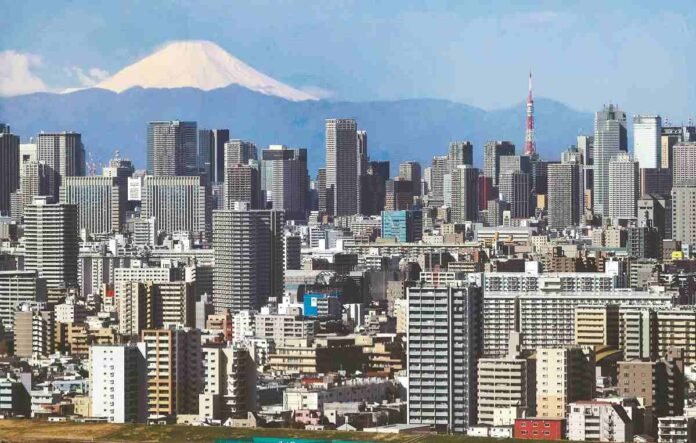Buildings in Tokyo are seen with Mount Fuji in the background in March 2021.
17:02 JST, May 7, 2024
Companies in rural areas are increasingly hiring “highly skilled foreign professionals,” people on special visas who have specialized knowledge and skills, amid a widening labor shortage. The percentage of highly qualified personnel working in areas other than Tokyo, where they used to be concentrated, has increased over the past decade.
According to the Ministry of Health, Labor and Welfare, there were approximately a record 2.04 million foreign workers in Japan as of the end of October 2023. That is 2.6 times as much as in 2014, with foreign workers active in many sectors.
The Ministry of Economy, Trade and Industry recognizes foreign workers who have graduated from Japanese or foreign universities and are engaged in research, development or overseas sales at Japanese companies as highly skilled foreign professionals. The national number of staff falling into this category has increased from 147,296 in 2014 to 457,386 in 2023, an increase of approximately 210%.
Tokyo has the largest number of highly educated foreign professionals, with 200,160 in 2023, an increase of over 160% from 75,144 in 2014. “There are many universities with foreign students and many companies with high salary levels, making it easy for them to to find a job [in Tokyo],” said an official from the Ministry of Economic Affairs.
However, the concentration of such personnel in Tokyo has declined, from 51% of that national number in 2014 to 43.7% in 2023. Domestic distribution has increased over the period in 30 prefectures, including Osaka and Aichi prefectures.
From 2014 to 2023, the rate of increase in the number of highly skilled personnel was particularly high in Shiga Prefecture, which increased from 717 to 4,489, or 520%. The numbers in Gunma Prefecture rose 440% from 1,218 to 6,657, and Kumamoto Prefecture rose 400%, from 552 to 2,792.
At a construction company in Mihara, Hiroshima Prefecture, 45 of the 85 employees are highly qualified foreign professionals who graduated from Vietnamese national universities and other institutions.
“Young Japanese [workers] don’t even think about rural areas. Talented foreigners are our lifeblood,” said the 77-year-old company president. The company, which holds several patents for seismic isolation and other construction methods, offers a salary and employee evaluation for foreign workers that is the same for Japanese workers. The company also encourages married couples to work together to support accompanying family members.
Prefectural governments are also taking steps to support local businesses. The Kagawa Prefectural Government will promote employment at companies in the prefecture during a Japanese language education course it will establish at the Vietnam University of Science and Technology in Hanoi this fiscal year. The Fukui Prefecture government is focusing on Myanmar and has begun providing support to recruit staff from the country.



